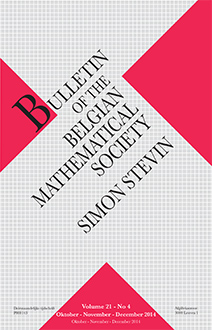Abstract
We are concerned with the following problem. Let $L$ and $K$ be fixed real numbers. When does the Koebe function $k(z)=z (1-z)^{-2}$ maximize the $N$th Taylor coefficient of $(1/f'(z))^L(z/f(z))^K$ for $f$ in the class $S$ of normalized schlicht functions? A sufficient condition for $L \geq -1$ is $1 \leq N \leq 2L+K+1$. A necessary condition is that a certain trigonometric sum involving hypergeometric functions is non-negative. These results generalize a recent theorem of Bertilsson and suggest a link between Brennan's conjecture in conformal mapping and Baernstein's theorem about integral means of functions in $S$.
Citation
Oliver Roth. Karl-Joachim Wirths. "A Generalization of Bertilsson's Theorem." Bull. Belg. Math. Soc. Simon Stevin 12 (1) 53 - 63, April 2005. https://doi.org/10.36045/bbms/1113318129
Information





